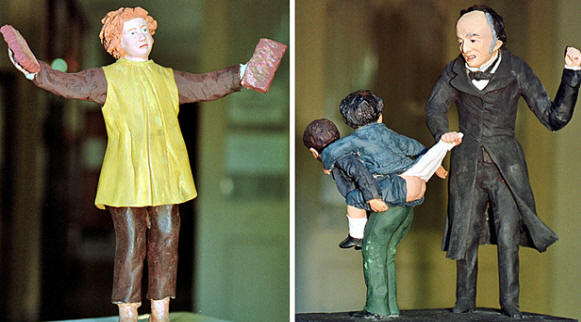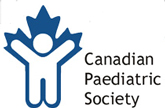
'Right to spank' law called public health threat
Law permitting physical punishment at odds with public health messages
CBC, February 6, 2012

A museum exhibit in Uruguay depicting forms of punishment in school is popular but thinking on physical punishment has shifted internationally since the UN adopted the Convention on Rights of the Child in 1990. (Reuters)
The Criminal Code's justification for physical punishment of children such as spanking should be removed, Canadian researchers say.
Monday's issue of the Canadian Medical Association Journal includes a paper reviewing how the understanding of the effects of physical punishment of children has shifted dramatically in 20 years.
Children who have experienced physical punishment tend to be more aggressive toward parents, siblings, peers and, later, spouses, and are more likely to develop antisocial behaviour, said Joan Durrant, of the department of family social sciences at the University of Manitoba and Ron Ensom of Children's Hospital of Eastern Ontario in Ottawa.
Physical punishment is also associated with a variety of mental health problems, such as depression, anxiety and use of drugs and alcohol.
Pain from punishment could disrupt parent-child attachment, increase levels of the stress hormone cortisol or interfere with how the brain regulates stress, Durrant and Ensom suggested.
They noted that when parents in more than 500 families were trained to reduce their use of physical punishment, the difficult behaviours in the children also declined.
'Never spank' health message
The authors called on doctors to educate parents on child development to reduce angry and punitive responses to normal child behaviours and to provide resources on positive discipline.
Messages such as Toronto Public Health's "Spanking hurts more than you think" and the Public Health Agency of Canada's "Never spank!" should be reinforced.
"Physicians can urge the federal government to remove Section 43 from the Criminal Code, which provides legal justification for the use of physical punishment, thereby undermining public health initiatives," the authors concluded.
The Supreme Court of Canada ruled in 2004 that parents have the right to spank their children. But the country's top court also set out "reasonable limits."
Those limits include:
- Spanking could be used against children between the ages of two and 12 years old.
- Children could not be disciplined with an object.
- Hits to the head would be unacceptable.
Spanking remains in Canada.
The authors said that effective discipline depends on "clear and age-appropriate expectations, effectively communicated within a trusting relationship and a safe environment."
more than 400 organizations in Canada have endorsed the Joint Statement on Physical Punishment of Children and Youth, which encourages positive approaches to discipline and states that physical punishment of children and youth plays "no useful role in their upbringing and poses only risks to their development."

Don't Spank - Canadian Paediatric Society
Effective discipline for children
Reaffirmed: February 1, 2014
Principal author(s)
P Nieman, S Shea; Canadian Paediatric Society, Community Paediatrics Committee
Paediatric Child Health 2004;9(1):37-41
The word discipline means to impart knowledge and skill - to teach. However, it is often equated with punishment and control. There is a great deal of controversy about the appropriate ways to discipline children, and parents are often confused about effective ways to set limits and instill self-control in their child.
In medical and secular literature, there is great diversity of opinion about the short-term and long-term effects of various disciplinary methods, especially the use of disciplinary spanking. This statement reviews the issues concerning childhood discipline and offers practical guidelines for physicians to use in counselling parents about effective discipline.
The Canadian Paediatric Society recommends that physicians take an anticipatory approach to discipline, including asking questions about techniques used in the home. Physicians should actively counsel parents about discipline and should strongly discourage the use of spanking.
![]()
Spanking May Lead to Aggression Later in Life
ABC TV, USA
07 February, 2012
Physical punishment of children, such as spanking, is increasingly linked with long-term adverse consequences, researchers wrote.
An analysis of research conducted since the 1990 adoption of the UN's Convention on the Rights of the Child suggests that no studies have found positive consequences of physical punishment, according to Joan Durrant of the University of Manitoba in Winnipeg, and Ron Ensom of the Children's Hospital of Eastern Ontario in Ottawa.
While some studies have found little effect either way, most research has uncovered a range of negative outcomes, including increased aggression and later delinquency, Durrant and Ensom wrote online in CMAJ.
The clinical implication, they suggested, is that doctors who are familiar with the research can help parents find more constructive ways of providing discipline.
"In doing so, physicians strengthen child well-being and parent-child relationships at the population level," they wrote.
They noted that as recently as 1992, physical punishment of children was widely accepted, thought of as distinct from abuse, and considered "appropriate" as a way of eliciting desired behavior.
But research under way at that time was beginning to draw links between physical punishment and aggression in childhood, later delinquency, and spousal assault.
